The Republic of South Africa is a unitary parliamentary democratic republic. The President of South Africa serves both as head of state and as head of government. The President is elected by the National Assembly and must retain the confidence of the Assembly in order to remain in office. South Africans also elect provincial legislatures which govern each of the country's nine provinces.

South Africa is divided into nine provinces. On the eve of the 1994 general election, South Africa's former homelands, known as Bantustans, were reintegrated into the country, and the four provinces were increased to nine. The borders of Natal and the Orange Free State were retained, while the Cape Province and Transvaal were divided into three provinces each, plus North West Province which straddles the border of and contains territory from both these two former provinces. The twelfth, thirteenth and sixteenth amendments to the Constitution of South Africa changed the borders of seven of the provinces.

A member of parliament (MP) is the representative in parliament of the people who live in their electoral district. In many countries with bicameral parliaments, this term refers only to members of the lower house since upper house members often have a different title. The terms congressman/congresswoman or deputy are equivalent terms used in other jurisdictions. The term parliamentarian is also sometimes used for members of parliament, but this may also be used to refer to unelected government officials with specific roles in a parliament and other expert advisers on parliamentary procedure such as the Senate parliamentarian in the United States. The term is also used to the characteristic of performing the duties of a member of a legislature, for example: "The two party leaders often disagreed on issues, but both were excellent parliamentarians and cooperated to get many good things done."

The Parliament of the Republic of South Africa is South Africa's legislature; under the present Constitution of South Africa, the bicameral Parliament comprises a National Assembly and a National Council of Provinces. The current twenty-eighth Parliament was first convened on 14 June 2024.

The Constitution of South Africa is the supreme law of the Republic of South Africa. It provides the legal foundation for the existence of the republic, it sets out the rights and duties of its citizens, and defines the structure of the Government. The current constitution, the country's fifth, was drawn up by the Parliament elected in 1994 in the South African general election, 1994. It was promulgated by President Nelson Mandela on 18 December 1996 and came into effect on 4 February 1997, replacing the Interim Constitution of 1993. The first constitution was enacted by the South Africa Act 1909, the longest-lasting to date. Since 1961, the constitutions have promulgated a republican form of government.

The National Council of Provinces (NCOP) is the upper house of the Parliament of South Africa under the (post-apartheid) constitution which came into full effect in 1997. It replaced the former Senate, but is very similar to that body, and to many other upper houses of legislatures throughout the world, in that its purpose is to represent the governments of the provinces, rather than directly representing the people.

The National Assembly is the directly elected house of the Parliament of South Africa, located in Cape Town, Western Cape. It consists of four hundred members who are elected every five years using a party-list proportional representation system where half of the members are elected proportionally from nine provincial lists and the remaining half from national lists so as to restore proportionality.

The Government of South Africa, or South African Government, is the national government of the Republic of South Africa, a parliamentary republic with a three-tier system of government and an independent judiciary, operating in a parliamentary system. Legislative authority is held by the Parliament of South Africa. Executive authority is vested in the President of South Africa who is head of state and head of government, and his Cabinet. The President is elected by the Parliament to serve a fixed term.

The Western Cape Provincial Parliament (WCPP) is the legislature of the Western Cape province of South Africa. It is located at 7 Wale Street in Cape Town.
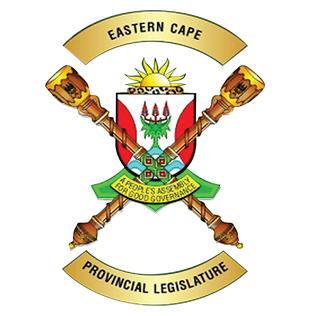
The Eastern Cape Provincial Legislature is the primary legislative body of the South African province of Eastern Cape. It is unicameral in its composition, and elects the premier and the provincial cabinet from among the members of the leading party or coalition in the parliament.
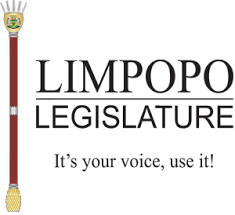
The Limpopo Provincial Legislature is the primary legislative body of the South African province of Limpopo.

The KwaZulu-Natal Legislature is the primary legislative body of the South African province of KwaZulu-Natal. It is unicameral in its composition and elects the premier and the provincial cabinet from among the leading party or coalition members in the parliament. Thami Ntuli of the Inkatha Freedom Party was elected Premier of KwaZulu-Natal at the first sitting of the provincial legislature on 14 June 2024.
In South Africa, a provincial legislature is the legislative branch of the government of a province. The provincial legislatures are unicameral and vary in size from 30 to 80 members, depending on the registered voting population of the province. Each legislature is chaired by a Speaker and a Deputy Speaker.
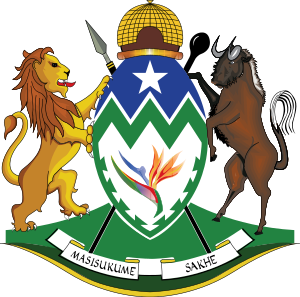
The Premier of KwaZulu-Natal is the head of government of the KwaZulu-Natal province of South Africa. The current Premier of KwaZulu-Natal is Thami Ntuli, a member of the Inkatha Freedom Party. He was first elected to assume this position, and took office, on 14 June 2024.
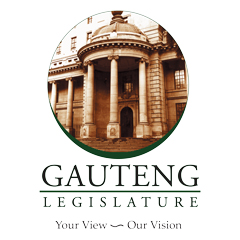
The Gauteng Provincial Legislature is the legislature of the South African province of Gauteng. It is a unicameral body of 80 members elected every five years. The current legislature, the seventh, was elected on 29 May 2024 and is a hung parliament with no overall majority for any party, with the African National Congress having lost its previous majority, but remaining the largest party with 28 members. The legislature is housed in Johannesburg City Hall in central Johannesburg.
The nine provinces of South Africa are governed by provincial governments which form the second layer of government, between the national government and the municipalities. The provincial governments are established, and their structure defined, by Chapter Six of the Constitution of South Africa.
The provincial councils were the legislatures of the four original provinces of South Africa. They were created at the foundation of the Union of South Africa in 1910, and abolished in 1986 when they were replaced by a strengthened executive appointed by the State President. The four provincial councils were the Cape Provincial Council, the Natal Provincial Council, the Transvaal Provincial Council and the Orange Free State Provincial Council.
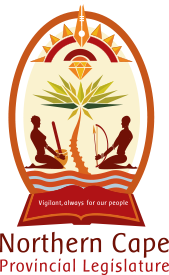
The Northern Cape Provincial Legislature is the legislature of the Northern Cape province of South Africa. It is a unicameral body of 30 members elected every five years. The current legislature was elected on 29 May 2024 with the African National Congress getting the most seats. It is situated in Kimberley, in a newly built complex to the west of the city centre on the edge of Galeshewe.

The Mpumalanga Provincial Legislature (MPL), previously known as the Eastern Transvaal Legislature, is the primary legislative body of the South African province of Mpumalanga.
Violet Sizani Siwela was a South African politician from Mpumalanga. She was a Member of the National Assembly, where she chaired the Portfolio Committee on Small Business Development, and a member of the National Executive Committee of the African National Congress (ANC). She served in the Mpumalanga Provincial Legislature until May 2019.














